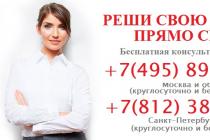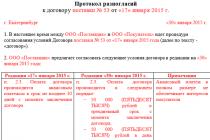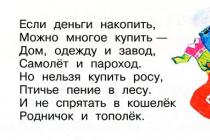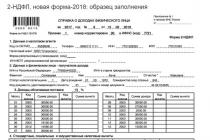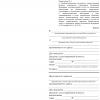The obligation to pay income tax is individuals who have the status of Russian tax residents, if the income is recognized by law as an object of taxation. However, some income is not subject to personal income tax.
In this article, we will get acquainted with the question of what kind of income is taxed and not subject to personal income tax in 2019.
Types of income and status of individuals
In order to understand which payments need to pay income tax, and which do not, it is necessary to take into account the status of an individual. Tax on income from any sources in the territory of the Russian Federation should be paid by persons who have the status of both a resident and a non-resident.
Income that is not subject to personal income tax does not depend on whether a person is a resident or not.
Payments subject to income tax
The Tax Code of the Russian Federation has a fairly wide list of personal income that is subject to personal income tax. According to article 208 of the Tax Code of the Russian Federation, the following payments are subject to income tax:
- funds received under a property lease agreement from an individual;
- money that was received from the sale own property, share or valuable papers;
- wages (including other forms of employee remuneration) and money for the performance of work or the provision of services;
- income in the form of dividends and interest received from Russian and foreign companies and organizations.
Note that in Chapter 23 of the Tax Code of the Russian Federation there is a list of income requirements that are subject to taxation and that are not subject to personal income tax in 2017.
Income that is not subject to income tax
Information about payments that are not subject to income tax is contained in Article 217 of the Tax Code of the Russian Federation. This applies to all individuals. The status in this case is not taken into account. Differentiation of payments helps to avoid disputes with tax officials.
Both the accountant and the employee should know which payments are not subject to personal income tax in 2019. We have collected all income not subject to income tax in the table below.
Table. Income that is not subject to personal income tax in 2019
|
Payment type |
A comment |
|
Alimony |
Does not depend on the amount of payment |
|
Pension payments |
Not subject to personal income tax and surcharges and benefits to pensioners (except for sick leave benefits) |
|
Scholarships |
Payments for studies at universities, as well as educational institutions middle management |
|
Grants (gratuitous aid) |
May be provided by the state or special organizations(list of organizations - in a special list of the Government of the Russian Federation) |
|
Lump sum payments |
This includes material assistance: to the family of a deceased employee who worked in the company, employees of the organization who have lost loved ones and relatives, employees of the organization who became parents (or adoptive parents) during the first year - there is no personal income tax from the amount up to 50,000 rubles for both parents |
|
Material help retired workers |
Regardless of the reason for leaving work (disability or old age). There is no income tax if the payment amount is less than 4,000 per year |
|
Compensation payments |
It applies to such payments (both at the federal and regional levels): for reimbursement of expenses for payment utility bills, for compensation for harm caused at the place of work or received in connection with dismissal (compensation for unused vacation not taken into account) |
|
per diem |
Within the Russian Federation - no more than 700 rubles for a business trip per day. For business trips abroad- no more than 2,500 rubles per day |
|
Reimbursement for medical expenses |
This includes payments not only to current, but also to former employees who have retired. |
|
Payment for the treatment of an employee or his family from the income of the employer |
Refers to employees laid off due to retirement. Personal income tax is not charged only if the funds were taken after taxes from the amount of the company's profit |
|
It does not matter from whom the gift was received - from an individual entrepreneur or from an organization. Income tax must be paid. |
|
|
One-time allowance at the birth of a child |
The allowance in the amount of 50,000 rubles at the birth of a child is not subject to personal income tax (Article 217 of the Tax Code of the Russian Federation) |
The payments contained in the table do not require payment of personal income tax both residents and non-residents of the Russian Federation.
New types of income that are not subject to personal income tax
Article 217 of the Tax Code of the Russian Federation was supplemented with some new clauses:
- one-time addition to the pension (clause 8.5 of article 217 of the Tax Code of the Russian Federation);
- monthly payments to military veterans (clause 69, article 217 of the Tax Code of the Russian Federation);
- payments to some self-employed, namely: nurses, tutors, housekeepers, cleaners if they inform the tax authorities about their occupation (clause 70 of article 217 of the Tax Code of the Russian Federation).
In conclusion, we add that in the 2-NDFL certificate, non-taxable income must be reflected if:
- the Tax Code has a restriction on the non-taxable amount of income;
- there is a separate code.
In any other situations, it is not necessary to indicate payments without tax in the 2-NDFL certificate.
The article was edited in accordance with the current legislation on 04/23/2019
It may also be useful:
Is the information useful? Tell friends and colleagues
Dear readers! The materials of the site site are devoted to typical ways of solving tax and legal issues, but each case is unique.
If you want to know how to solve your particular issue, please contact the online consultant form. It's fast and free! You can also consult by phone: MSK - 74999385226. St. Petersburg - 78124673429. Regions - 78003502369 ext. 257
The main obligation for all citizens living in the country is the payment of taxes. The payers of mandatory property fees include immovable objects. However, the law also provides for some exceptions. What real estate is not taxed, who is entitled to a tax relief, we will consider further.
Is that all real estate subject to property tax? Photo No. 1
The rules for accrual and payment of property are contained in tax code(TC RF, code). Article 401 of the Code lists all objects for which the specified fee must be paid. These include:
- Premises suitable for permanent residence (these include houses in summer cottages, gardens and household plots, allotments for subsidiary plots).
- Garages and parking spaces.
- Objects whose construction is not completed.
- Unified real estate complexes.
- Other structures (structures), premises and buildings.
Based on this list, it turns out that the ownership of any real estate is associated with the payment of taxes. Both residential and non-residential premises, and unfinished facilities, and even parking spaces require their owners to bear the tax burden. But the legislator provided for a system of deductions to reduce tax liabilities citizens.
In fact, from the amount calculated for the payment of tax, you need to deduct the cost:
- 50 (fifty) sq.m. for residential buildings;
- 20 (twenty) sq.m. for ;
- 10 (ten) sq.m. for rooms;
- one million rubles for real estate complexes.
It turns out that if a private house on garden plot has an area of not more than fifty square meters, then you do not need to pay tax. In other cases, its size will decrease by the amount of the calculated deduction. You can use the deduction for all objects belonging to the person.
If the property has several owners, then everyone has the right to use this deduction. You do not need to pay any fees to take possession of shares in the property of apartment buildings.

Which citizens can not pay property tax? Photo #2
If deductions are granted to all owners without exception, then only individuals. Their categories are listed by article 407 of the code:
- Heroes of the USSR and the Russian Federation, persons who received the Order of Glory of three degrees as an award;
- disabled people of the first, second groups, childhood;
- participants in the Second World War, civil and other wars, military operations, these military operations;
- persons who served in the troops, navy, internal organs, institutions that took part in the Second World War;
- persons exposed to the harmful effects of radiation at the Chernobyl nuclear power plant, Mayak, r. Techa, Semipalatinsk test site;
- military (former military) with twenty or more years of service;
- members of military families who have lost their breadwinner;
- pensioners;
- persons who have received radiation sickness or disability as a result of nuclear tests;
- creative persons to the premises used by them for workshops, studios, organization of non-state exhibitions, galleries, museums;
- owners of buildings with an area of up to fifty square meters, located in summer cottages, garden lands, lands for individual housing construction.
All listed persons are entitled to a benefit equal to the amount of the accrued tax. However, it is not provided automatically, but requires an application from the beneficiary. Therefore, the beneficiary must independently take care of granting him exemption from paying the fee.
It should be borne in mind that benefits can only be obtained for the use of property for personal purposes. Owners of unified real estate complexes and unfinished objects do not fall under the preferential regime.
Nuances

The nuances of calculating and granting benefits on real estate tax. Photo #3
It is important for persons who own real estate to be aware of the nuances of accrual and exemption from tax fees. The tax authorities are responsible for calculating the amount to be paid. But payers should check the calculations and notify the tax authorities of the existence of grounds for granting them benefits.
Exemption from payment can be granted only if there is an application and documents confirming the respective right of the property owners. You can use the privilege only for one of the objects of each group. For example, a benefit is provided for one apartment, one garage or other building. At the same time, for the second object, the beneficiary can use the deduction provided for all owners.
It is important to remember that taxpayers themselves must notify the tax office of their real estate. If the tax office reveals unrecorded objects, then in addition to collecting tax arrears, penalties may also be charged.
Almost any real estate or a share in it must be taxed. Only certain categories are exempted from payment. Owners of premises (buildings) of a small area (up to fifty square meters) will not have to pay either. Without exception, all owners of immovable objects can reduce the amount tax collection on the amount of the deduction.
Recording a program on a topic preferential taxation with the participation of the chairman of the trade union of gardeners of Russia, you can listen in this video:
Write a question housing lawyer in the form below see also Phones for consultation
15 Jan 2018 70Income tax (IT) is the main type of tax burden enshrined at the legislative level in the territory Russian Federation. This type of deduction is levied on any amount that was earned or was a source of income for an individual. Important information - the state does not provide any benefits for the minimum amount revenue part. What amount is not subject to income tax? Let's consider this issue in the article.
What he really is
Wages - a form of allowance, expressed in a specific amount Money, for which a citizen, after receiving them, has the opportunity to purchase various goods and services.
Before receiving the salary, the accounting department is obliged to make a deduction from the total amount of the income part of certain taxes and contributions determined by the legislation of the Russian Federation. Usually these are organizations.
(PN) is levied on any type of income - wages, dividends or other types of profit.
However, the law provides for specific types of income from which this tax not charged.
Russian legislation determines that a resident of the Russian Federation must pay (PN) in the amount of 13% of the total amount of income.
On the video, from what amount income tax is not taken:
What amount is not subject to income tax
Is it taxable and is there a sick leave fee
An employee of an enterprise who is ready to begin work duties must provide sick leave to your employer. At the same time, he is entitled to receive mandatory compensation at the expense of the employer during the entire period of incapacity for work.
The size of the transfer is equal to the sum of the average wages per month during absence from work. This amount is part of the income of an individual, therefore, is subject to taxation in without fail.
Since benefits on a temporary disability sheet relate to the employee's income, they are taxed (PN).
Maternity payments
On the territory of Russia, expectant mothers in the period of 70 days before the birth and 70 days after them are subject to mandatory social insurance.
According to tax legislation, government benefits paid to citizens of the country are not subject to taxation. This also affects the amount of maternity transfers. 
Only those payments that are defined as expenses of the enterprise in the state tax system can be subject to taxation. Decree amounts are not subject to this category because the state lists them.
Important - surcharge to maternity sum for the position is taxed, because it is accounted for as profit.
In such circumstances, the company spends a specific amount of money on the work of the employee.
Alimony
In paragraph 5 of Art. 217 of the Tax Code of the Russian Federation, it is determined that the amount of alimony is included in the list of income that is not subject to taxation.
Important - the amount of the penalty that is collected from the alimony payer due to delay is not subject to taxation mandatory contribution on alimony.
What is, is described in detail in the article.
Alimony transfers are not considered the income of the person who acts as the final recipient of funds. Alimony - an option for redistribution between parents financial resources which are necessary for the quality maintenance of a joint child.
There is a certain order. 
- The salary for the month of the alimony payer is formed.
- All withheld from salary necessary deductions including income tax.
- From the remaining amount of wages, alimony is deducted within the framework of the current executive document.
- After that, the alimony is transferred to the final recipient.
Vacation
Because money transfers for vacation are included in the category of employee income, therefore, taxation is carried out in statutory general order. Retention order (PN) with vacation pay similar to the procedure for deducting from monthly earnings.
Material help
Important - the obligation to pay tax will directly depend on the basis of the payment, its size and nature.
There are two options - material assistance, which is subject to taxation, and exempt from payment. 
If material assistance is provided to an employee from an enterprise in the general case, then (PN) is charged at a rate of 13%.
However, there is a certain list, according to which, this form of payment is exempt from taxes.
Important - specific limits are determined by law.
The list of types of material support from the employer that are not subject to taxation is indicated in Art. 217 NK.
Is there a minimum threshold from which income tax is not collected?
In accordance with Russian legislation, individuals who act as tax residents are required to pay income tax.
In addition, if an employee has two jobs, then the reduction income tax possible only from the main income. Is the premium taxable? Income tax or personal income tax applies to almost all types of income, and bonuses are no exception. As with earnings, personal income tax in the form of 13% is also removed from them. The same rule applies to other allowances. Wherein, insurance premiums are not collected from such payments. Employer's Responsibility In the event that an employer intentionally evades paying taxes and other deductions from the wages of its employees, it must be aware of all the existing risks that may actually be encountered. So, when revealing "gray" or "black" schemes, the legislation provides for punishment for the head in the form of administrative responsibility. According to the Tax Code of the Russian Federation, punishment can be expressed in penalties of up to 10%.
Payroll income tax. payroll income tax
Income tax on wages (personal income tax), its size, calculation mechanism and existing benefits for payers, all categories of Russian citizens are interested, since the income of each person depends on its application. VAT: what is it? Being the main mandatory tax, personal income tax is withheld from almost all types of income of an employed individual, with some exceptions. There is a small list state benefits and non-taxable compensation.
The tax rate varies from 9 to 35% and depends on the nature of the income. To find out what income tax should be charged from wages, we will deal with the features of its payment.
What amount is not subject to child tax when calculating salaries
Also, to determine the amount of insurance premiums, it is necessary to determine the type of employee's income, his status, and know his date of birth. Calculate insurance premiums Pension Fund, social insurance fund, compulsory health insurance, insurance premiums in case of temporary disability and in connection with motherhood. Amount of personal income tax calculated and retained by Romashka LLC transferred to the budget of the Russian Federation.
The deduction of taxes from wages to the budget (personal income tax) must be made directly upon payment of income to the employee, i.e. on the same day. The deduction of insurance premiums from wages is carried out by payers of insurance premiums, separately to each state off-budget fund. During the billing period, the company pays insurance premiums in the form of monthly mandatory payments.
Features and calculation of income tax on employee wages
Help 2-NDFL contains the following information:
- about the employer;
- employee data;
- the total and monthly income of the employee, taxed at the established rate;
- data on deductions (with a code designation);
- the amount of income tax withheld.
An employee can obtain a document from the company's accounting department. The term for receiving this document is no more than three days. The certificate must contain such details as the visa of the head and the seal of the organization.
Help 2-NDFL may be needed when obtaining large loans from a bank, mortgage loans. The document cannot be edited. Personal income tax calculation formula You can calculate personal income tax using the following formula: personal income tax = NB x RNS / 100, where: NB - tax base; RNS - size tax rate determined for each specific taxpayer.
Calculation of income tax from salary
To receive a tax deduction, citizens submit to tax office income statement for last year. It must be accompanied by documents confirming the expenses incurred. Please note that taking into account tax base includes:
- salaries;
- rates;
- premiums;
- allowances;
- increasing coefficients.
If an employee has reporting period there was no earnings (for example, he was on vacation or ill), the tax is calculated from the average earnings. Workers working under a contract agreement pay personal income tax in the usual manner.
Help 2-NDFL Help 2-NDFL - a document that the employer issues to the employee for certain period. It could be a year or 6 months. The document is required for the calculation of income tax from wages.
Which salary is not subject to income tax?
- Personal income tax (PIT), if we are talking about legal wages, is withheld in the amount of 13% of almost all income that your employer pays you. Available standard deductions for children, soldiers who served in hot spots that are provided at the request of the employee until the employee earns 280,000 from the beginning of the year. Personal income tax is not subject to maternity allowance, allowance for caring for a child under 1.5 years old, allowance for the birth of a child, allowance for women registered in early dates pregnancy, burial allowance (these are all state benefits that employees receive through the employer). Personal income tax is also not subject to the amount of material assistance up to 4000 rubles (in total for the year, that is, you were given 1000 in January, then in June 2000, in December 2000 here in December, personal income tax will be withheld from 1000), as well as the amount of gifts up to 4000 rubles.
Income tax on wages in 2018
The tax in the total amount is transferred to the budget. It does not affect financial results companies, reducing only the amount of earnings of employees. The organization itself is only tax agent, acting as an intermediary, collecting tax, summing it up and transferring it to the budget.
- 06.09.2014
Read also
- Is the premium taxable? Types of awards. Income tax
- How to calculate salary for a day, a month and an incomplete month: step by step instructions
- Is sick leave taxable? Calculation rules
- Benefits for disabled people of the 3rd group when paying taxes.
Social benefits for disabled people of the 3rd group - How to get a tax refund on the purchase of an apartment. How to get a tax refund on the purchase of an apartment at a time
- What taxes does an LLC pay? What taxes does the founder of an LLC pay?
- Cost of living in the United States (table).
How much tax is deducted from the salary?
- financial assistance, if during the year its amount exceeded four thousand rubles;
- financial assistance received in the event of the birth of a child, if its amount exceeded fifty thousand rubles;
- termination benefits, the amount of which is higher than three times the average wage;
- daily allowance exceeding seven hundred rubles a day for business trips within the Russian Federation and 2,500 rubles for business trips abroad.
The following payments are not subject to income tax:
- material help;
- donor rewards;
- alimony;
- pensions;
- scholarships
- severance pay upon dismissal;
- compensation for damage from injury;
- travel expenses;
- compensation payments.
It should be noted that in most cases the personal income tax rate is 13%.
If the payer falls under several preferential degrees, then the highest amount is taken into account, the deductions cannot be summarized. So, for example, income tax on the salary of disabled people is reduced by 500 rubles, but if the disability was obtained during the liquidation of the Chernobyl accident, then the deduction will be 3,000 rubles, not 3,500 rubles. The law obliges the employer to take into account standard deductions, other types of deductions are controlled by the taxpayer and the company is not provided. The exercise of the right to apply deductions is realized by citizens by submitting a declaration of income received to the tax office or by submitting an application for expenses incurred. Features of the application of tax The most common from the amount of earnings is personal income tax rate in the amount of 13%.
How to pay payroll taxes
Many employers make these personal income tax deductions even before transferring earnings to their employees. However, in the case of "gray" and "black" salaries, these manipulations are not performed. Therefore, the employee must declare his earnings on his own in order to avoid punishment for tax evasion.
Important
Income Personal income tax acts as the main tax on wages and other types of income. It is the income tax, as mentioned above, that directly depends on the income of a citizen and amounts to 13%. Unlike other payments, this species tax is levied on almost any type of income.
At the same time, it is worth pointing out that personal income tax is 13% in relation to not all income. So, for example, its size can increase up to 35%.
Income tax on wages (PIT), its size, calculation mechanism and existing benefits for payers are of interest to all categories of Russian citizens, since the income of each person depends on its application.
VAT: what is it?
Being the main mandatory tax, personal income tax is withheld from almost all types of income of an employed individual, with some exceptions. There is a small list of state benefits and compensations that are not subject to income tax. The tax rate varies from 9 to 35% and depends on the nature of the income. To find out what income tax should be charged from wages, we will deal with the features of its payment.
Residents and non-residents: differences in the tax rate
The law provides clarifications in determining the status of "tax resident", which is necessary for the correct personal income tax calculations, because the differences in the size of tax rates for different categories of payers are very impressive.
A tax resident is a person who resides in Russian territory a total of 183 days from the last year.
He can be a citizen of Russia, a foreigner or a stateless person, i.e. the status of "tax resident" is assigned to any individual, regardless of his place of residence and citizenship.
It should be noted that the status is determined on the end date tax period summation method calendar days stay of the payer in Russia for Last year. The 183-day period includes the days of arrival and departure.
Income tax on the salary of tax residents is 13%. Personal income tax on the income of a non-tax resident payer is 30% of the amount of earnings. The status is established periodically when income is paid, during the year it can change several times.
Taxable income
Income tax is charged on the following income:
Salary accrued under an employment contract or contract;
Dividends of part of the profits to the owners of companies;
Leasing of property;
Realization of property: premises, buildings, cars, securities and shares in companies;
Winnings and prizes;
Material benefit (interest from deposits).
Income tax on salaries and non-taxable income
So, all the main accrued incomes of an employed citizen (salary, bonus allowances, amounts for employment contracts, one-time loyalty incentives and regional incremental adjustment factors) are taxable.
But there is also a list of payments that are not subject to income tax. Material assistance, alimony for the recipient party, pensions, scholarships, one-time, state and severance payments for downsizing or compensation for damage from injury and other compensation payments are not subject to personal income tax.
Payment of income tax on salaries, rates and determination of the tax base are regulated by articles 210, 217, 218-221, 224 of the Tax Code of the Russian Federation. Income tax is federal. The proceeds from its payment go to different budgets. Legislatively established the amount of tax to be credited: 70% receive budgets Russian subjects RF, 10% - budgets of settlements, 20% - municipal district budgets.
Calculation procedure
Income tax on salaries is calculated in the following order:
The full accrual of earnings for the reporting period is made;
The amount of accrued earnings is reduced by the amount non-taxable income if they were charged;
The status of the taxpayer is determined;
It is established whether the payer has the right to a tax deduction;
The total amount of accrued income is reduced by the amount of the tax deduction, if there are grounds for its application;
From the received tax base, income tax is calculated: a resident pays personal income tax in the amount of 13%, a non-resident - 30%.
tax deductions
Tax deductions play an important role in the calculation of personal income tax, so it is necessary to find out the possibility of their use in calculating income tax. Tax deductions are standard, social, property and professional.
The law establishes standard deductions in the amounts of 500, 1400 and 3000 rubles.
Monthly deduction of 500 rubles. intended:
Heroes of the USSR and the Russian Federation;
Participants of the Second World War and hostilities, retired military;
Disabled people I and II gr.;
Victims of the Chernobyl accident and Mayak, etc.
Parents of the first two minor children are given a deduction of 1,400 rubles for each. It operates as wages rise and, having reached 280,000 rubles, automatically excludes further action until the end of the financial period.
For a monthly deduction of 3000 rubles. they have a right:
The liquidators of accidents at the Chernobyl NPP and the Mayak Production Association, who received disability or a serious illness as a result of these actions;
Parents or guardians of a disabled child, three or four children;
Disabled veterans of the Second World War and disabled participants in other military operations;
Nuclear weapons testers, etc.
If the payer falls under several preferential degrees, then the highest amount is taken into account, the deductions cannot be summarized. So, for example, income tax on the salary of disabled people is reduced by 500 rubles, but if the disability was obtained during the liquidation of the Chernobyl accident, then the deduction will be 3,000 rubles, not 3,500 rubles. The law obliges the employer to take into account standard deductions, other types of deductions are controlled by the taxpayer and the company is not provided. The exercise of the right to apply deductions is realized by citizens by submitting a declaration of income received to the tax office or by submitting an application for expenses incurred.

Features of the application of the tax
The most common with the amount of earnings is the personal income tax rate of 13%. In addition to it, other tax rates apply for different categories of payers and types of income:
9% - taxation of dividends from shares and own shares of companies;
30% - the amount of tax for non-residents;
35% - personal income tax, which is subject to winnings in excess of 4 thousand rubles, as well as material gain from interest on bank deposits.
If the taxpayer has children, then the monthly tax deduction for the reporting month- 1400 rubles each for the 1st and 2nd imperfect child, 3000 rubles. - for the 3rd and subsequent children.
income tax from minimum wage paid in accordance with general order, since any income is a tax base and is subject to personal income tax.
Single parents (for example, a single mother) are legally entitled to double deduction in 2800 rubles, which is applied until the salary exceeds the level of 280,000 rubles. In addition, this benefit ends when the parent marries.

Return of personal income tax
Russian legislation defines a number of conditions when the taxpayer has the right to return the amount of personal income tax paid from wages. This will be social or property tax deduction. Naturally, there must be grounds for a return. These include:
Buying or building a home;
Mortgage;
Teaching children or their own;
Treatment and purchase of medicines.
To return the tax to the IFTS, it is necessary to submit a package of documents confirming the costs incurred with copies attached to them. It should be noted that the filing of the application takes place in the next financial year after the period in which the expenses are incurred, and in order to receive a refund, income tax must be deducted from the salary.
Enterprises calculate personal income tax separately for each employee. The tax in the total amount is transferred to the budget. It does not affect the financial result of the company, reducing only the amount of earnings of employees. The organization itself is only a tax agent, acting as an intermediary, collecting tax, summing it up and transferring it to the budget.


